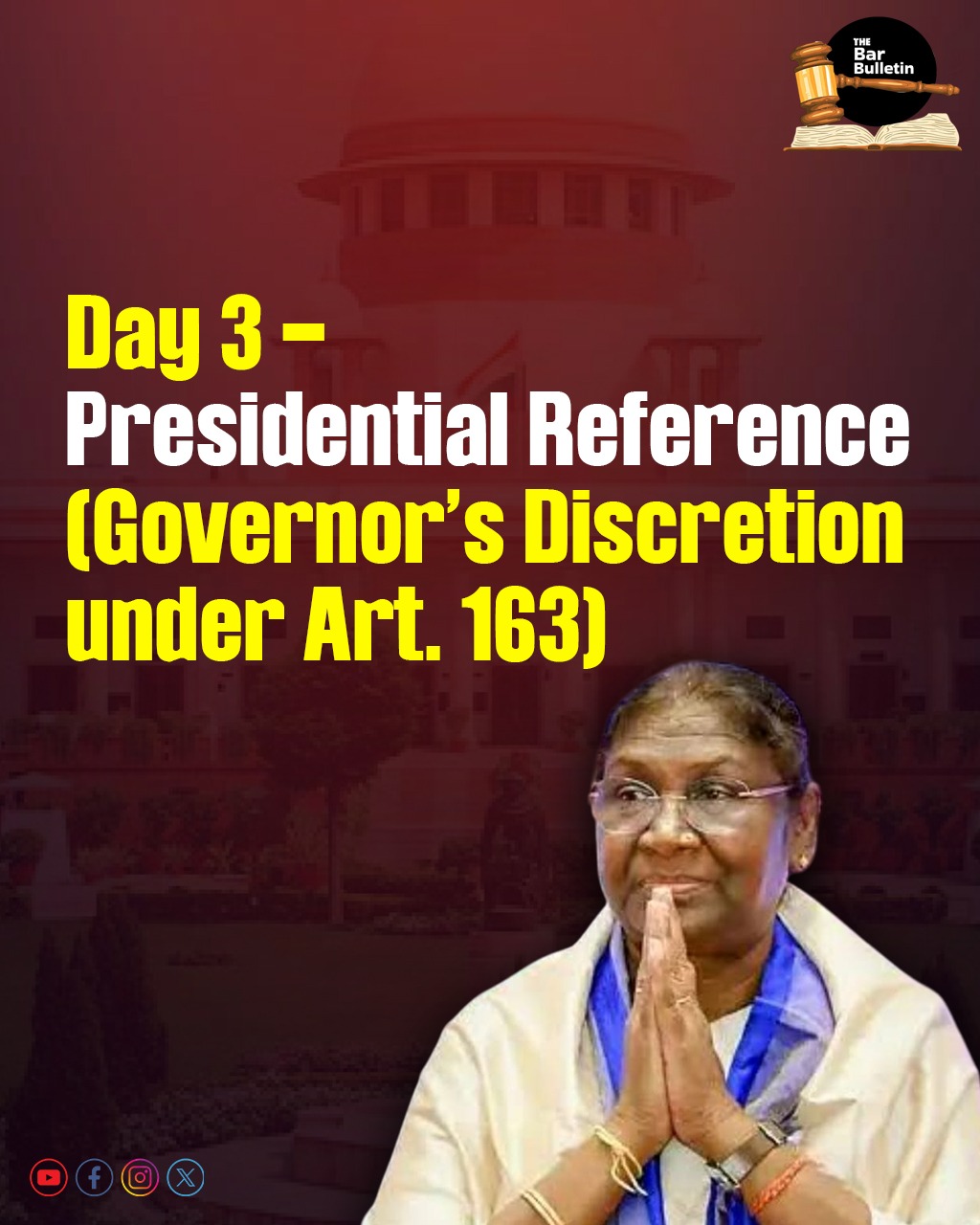The Supreme Court entered its third day of hearing the Presidential reference case which arose from the impasse in Tamil Nadu, where the Governor had kept several bills passed by the State Legislature pending for months without granting assent under Article 200. The State government approached the Supreme Court alleging that the Governor’s inaction was stalling rightful governance and undermining the constitutional scheme. The Court’s consideration of this reference is to clarify the extent of the Governor’s discretion
under Article 163, whether delays in assent can be judicially controlled or not.
On August 21, SG Tushar Mehta submitted that while the Governor is ordinarily bound by aid and advice, limited spheres of discretion exist, including appointment of Chief Minister (when no Council exists), assent/withholding of bills under Article 200, and dissolution when majority is in doubt.
He relied on Shamsher Singh v. State of Punjab to emphasise that the Governor is not a “figurehead” but has narrowly defined discretionary space. He distinguished Nabam Rebia v. Deputy Speaker, arguing that paras 151–152 (often overlooked) actually clarify that discretion exists but is limited. He also pointed to B.K. Pavitra v. Union of India and later Tamil Nadu cases show inconsistent application of Nabam Rebia, which makes authoritative clarity mandatory.
On judicial review, SG accepted that discretionary acts are reviewable if mala fide, but pressed that courts cannot fix timelines for Governors on bills, nor invoke Article 142 to “deem” assent — doing so would amount to judicial legislation.Finally, he argued that such disputes are properly federal questions under Article 131, and not maintainable as Article 32 petitions. Political-constitutional remedies (CM approaching PM/President) were highlighted as the correct route rather than judicial directives.
Senior Advocate Neeraj Kishan Kaul argued on the scope of Article 200, submitting that the Governor has four structured options when a bill is presented — (i) assent, (ii) withhold assent, (iii) reserve for President, or (iv) return for reconsideration under the proviso. He emphasised that the proviso is an independent preliminary option aimed at consultation, not merely adjunct to withholding assent, and once exercised, the Governor cannot later withhold assent. Stressing the phrase “as soon as possible”, he contended that the Constitution bars indefinite delay and envisages an expeditious consultative process. Referring to the Government of India Act, 1935 and Constituent Assembly debates, he argued that the Governor is not a rubber stamp, but plays a role in the legislative process with limited discretion under Article 163.
The matter remained part-heard, and arguments will continue tomorrow.
Citations-
Shamsher Singh v. State of Punjab- (1974) 2 SCC 831 : AIR 1974 SC 2192
Nabam Rebia v. Deputy Speaker- (2016) 8 SCC 1 : AIR 2016 SC 6053
B.K. Pavitra v. Union of India- (2019) 16 SCC 129 : AIR 2019 SC 2723
Appearances-
Senior Advocate K.K. Venugopal – for the State of Kerala
Dr. Abhishek Manu Singhvi, Senior Advocate – for the State of Tamil Nadu
S GTushar Mehta, Solicitor General of India – for the Union of India
Senior Adv. Neeraj Kishan Kaul – assisting the Solicitor General
A.G R. Venkataramani – for the Union of India



